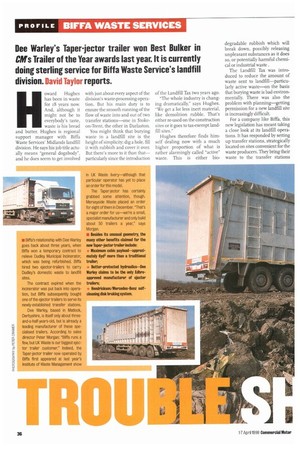Dee Warley's Taper-jector trailer won Best Bulker in CM's Trailer
Page 38

If you've noticed an error in this article please click here to report it so we can fix it.
of the Year awards last year. It is currently doing sterling service for Biffa Waste Service's landfill division. David Taylor reports.
Haward Hughes has been in waste for 18 years now. And, although it might not be to everybody's taste, waste is his bread and butter. Hughes is regional support manager with Biffa Waste Services' Midlands landfill division. He says his job title actually means "general dogsbody", and he does seem to get involved
with just about every aspect of the division's waste-processing operation. But his main duty is to ensure the smooth running of the flow of waste into and out of two transfer stations—one in Stokeon-Trent, the other in Darlaston.
You might think that burying waste in a landfill site is the height of simplicity: dig a hole, fill it with rubbish and cover it over. But there's more to it than that— particularly since the introduction of the Landfill Tax two years ago.
"The whole industry is changing dramatically," says Hughes. "We get a lot less inert material, like demolition rubble. That's either re-used on the construction sites or it goes to tax-exempt landfill sites."
Hughes therefore finds himself dealing now with a much higher proportion of what is rather alarmingly called "active" waste. This is either bio
degradable rubbish which will break down, possibly releasing unpleasant substances as it does so, or potentially harmful chemical or industrial waste .
The Landfill Tax was introduced to reduce the amount of waste sent to landfill—particularly active waste—on the basis that burying waste is bad environmentally. There was also the problem with planning—getting permission for a new landfill site is increasingly difficult.
For a company like Biffa, this new legislation has meant taking a close look at its landfill operations. It has responded by setting up transfer stations, strategically located on sites convenient for the waste producers. They bring their waste to the transfer stations




































































































